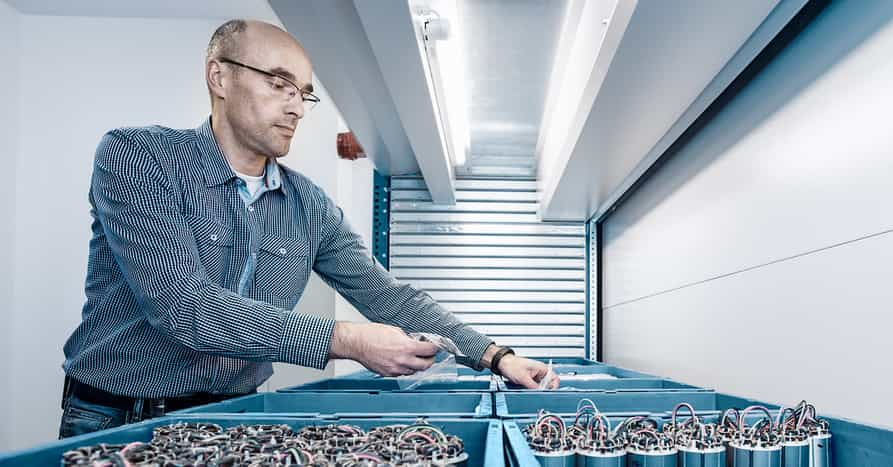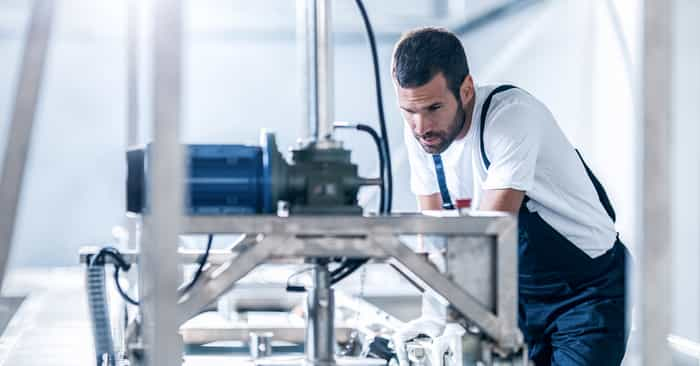Goods to person picking (also known as GTP) is an order fulfillment method using an automated storage and retrieval system (ASRS) to deliver items or goods directly to the operator (person) while they remain at their workstation. It’s literally bringing the goods to the person – hence the name goods to person picking.
In contrast, a manual warehouse operation consisting of static shelving, racks or drawer systems uses a person-to-goods picking method where the worker (person) walks through the aisles collecting the items or goods required as they go. Here, the person is physically going to the goods – thus the name person to goods.
As demands on warehouses increase, goods to person picking systems are becoming standard in warehouse and distribution centers as they are a surefire way to improve worker ergonomics and increase productivity. By delivering the goods to the person, the worker can fill the order far more efficiently.
On top of that, employers experience significant indirect costs associated with a worker injured on the job — from two to 20 times higher than direct costs. That’s because there are so many hidden or unanticipated expenses resulting from an employee injury. It doesn’t take much for this to add up.
Goods to person picking systems
The foundation of any goods to person picking system is a technology that can store and deliver
goods to an operator – an ASRS. There are a variety of ASRS technologies on the market
today including:
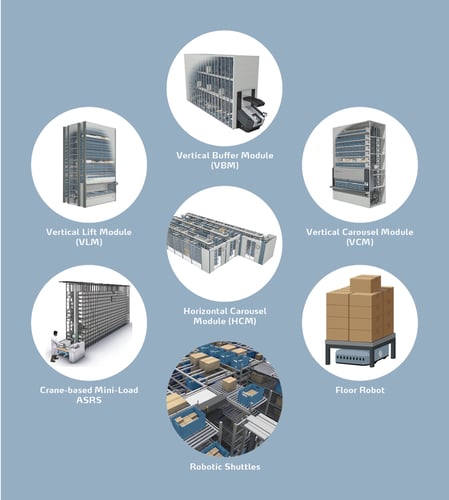
- Shelf and Tray ASRS Technologies
- Vertical Carousel Modules (VCMs)
- Horizontal Carousel Modules (HCMs)
- Vertical Lift Modules (VLMs)
- Bin and Tote ASRS Technologies
- Crane Based Mini-Loads
- Vertical Buffer Modules
- Robotic ASRS Technologies
- Robotic Shuttle Systems
- Robotic Cube Storage Systems
- Floor Robots
For a deeper dive on these technologies: 8 Types of Automated Storage and Retrieval System (ASRS)
While different in size, speed, density, functionality and cost – all ASRS technologies deliver stored goods to an operator to increase efficiencies. The heart of a goods to person picking system is the software. Using an inventory management software or warehouse management system, the software organizes the picks and delivers goods to the operator for maximum efficiency. From storing frequently used goods closest to the operator access point to executing a LIFO or FIFO picking strategy - the software is often what adapts the goods to person picking system to your specific operational needs.
Why use goods to person picking systems?
Goods to person picking systems easily scale to match growing order volume or allow for an increase in inventory. These systems are proven to improve ergonomics and increase productivity.
Increase Productivity
In addition to enhancing warehouse safety, goods to person picking boosts productivity and reduces labor costs. Delivering goods to the operator keeps the operator in their work zone, eliminating time spent walking from location to location and making more efficient use of the operators time.
Goods to person picking systems are equipped with pick-to-light technology that displays the item’s location and quantity required for accurate picking, dramatically reducing the time spent searching for a specific item.
Further, picks are sequenced within an ASRS so the machine’s movement is optimized to provide the items required by the operator in the most efficient order. This means all items can be picked in one rotation, or cycle, of the machine’s storage bins or trays, maximizing pick time.
Facilities implementing an automated goods to person picking system most often choose to maintain current labor levels and benefit from the increased productivity. Increased picking capabilities enable the consolidation of multiple picking operations, meeting increasing order demands and accommodating the addition of more items to inventory. Alternately, implementing these solutions facilities can reduce labor requirements and compensate for scarce or unreliable labor.
Improve Worker Ergonomics
To improve employee performance and reduce worker injury, organizations are deploying goods to person picking systems to help workers complete warehouse order fulfillment tasks while reducing the risk of injury.
Workers in a conventional warehouse spend as much as 60% of their time walking through shelving searching for stored items. An automated goods to person picking system improves warehouse safety by eliminating this unproductive, repetitive and physically tiring travel and search time.
Additionally, manual picking operations frequently require a picker to reach, bend, lift, twist, stretch, push or pull to retrieve items from the shelf once they do find them. Manual warehouses with shelving are often characterized by poor visibility with dusty, dirty products tucked into back corners or up on top shelves.
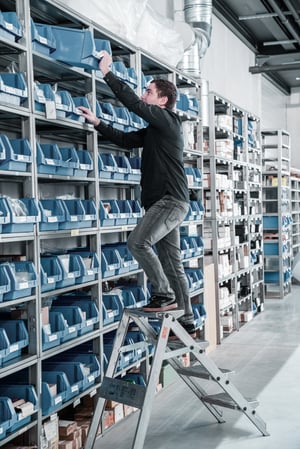
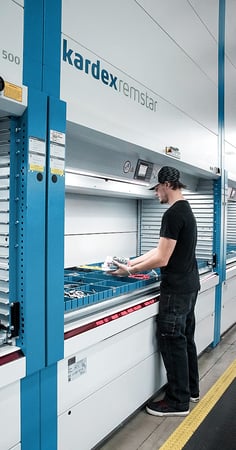
To avoid potential injury, it is recommended that workers pick items from the ‘golden zone,’ which extends from the belt height to the shoulder height of the average individual. Items within this zone can be grabbed or moved without either stretching or bending.
ASRS technologies are designed for ergonomic delivery to create a working environment that minimizes injuries. Walking long distances or climbing ladders is no longer necessary. Not only does this reduce fatigue, but the chance of worker injury is substantially reduced. In turn, absenteeism, insurance premiums and claims for worker’s compensation are lowered.

